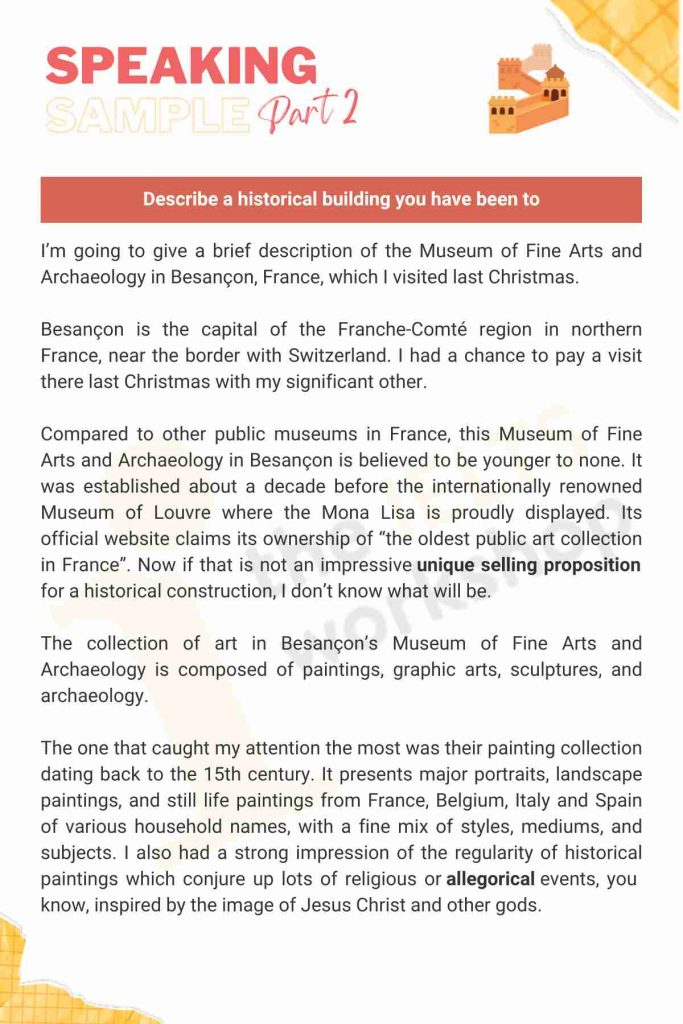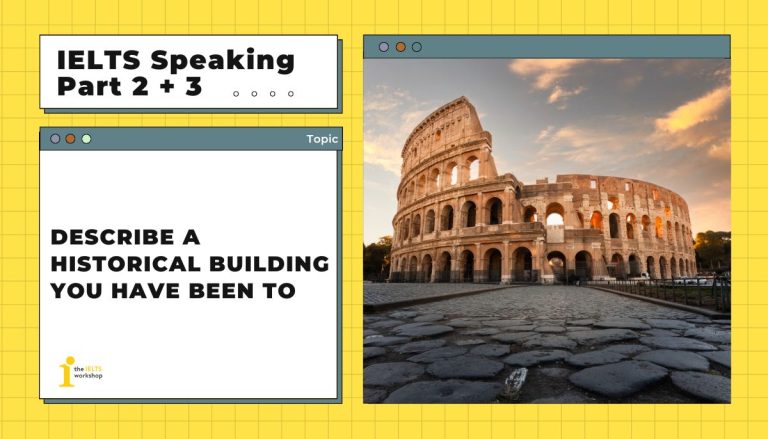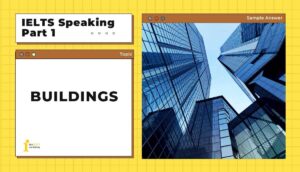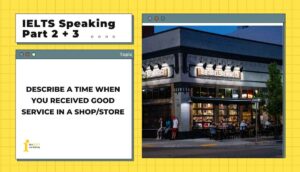Cùng The IELTS Workshop tham khảo cách giải Topic IELTS Speaking Part 2 chủ đề: “Describe a historical building you have been to” qua bài mẫu của cô Thu Hà. Đừng quên take note lại từ vựng và các cấu trúc ghi đểm bạn nhé.
Part 2: Describe a historical building you have been to
Describe a historical building you have been to
You should say:
Where it is
What it looks like
What it is used for now
What you learned there
And how you felt about this historical building
Dưới đây là bài mẫu cho topic “Describe a historical building you have been to”.
1. Bài mẫu (Sample)


2. Từ vựng (Vocabulary)
- A unique selling proposition (phr) = a selling point (phr): (thuật ngữ ngành marketing) điểm nổi bật ở sản phẩm hoặc dịch vụ, dùng để thu hút khách hàng hàng tiềm năng
- Allegorical (adj): mang tính ngụ ngôn (truyền tải thông điệp đạo lí thông qua những hình ảnh ẩn dụ về loài vật)
- The (graphic arts / …) cabinet (n): khu vực trưng bày những tác phẩm nghệ thuật (sử dụng đồ họa / hoặc những loại hình khác)
- Full-length or bust portraits (n): những bức chân dung toàn thân hoặc bán thân
- Animal mummies (n): xác ướp động vật
- The viscera of an embalmed body: nội tạng của một cơ thể làm xác ướp
- Funerary (adj): liên quan đến tang lễ
- The folk belief in the afterlife: tín ngưỡng dân gian về thế giới bên kia
Part 3
Why do people visit historical buildings?
Do Vietnamese people like to visit historical buildings?
Do most people agree to the government’s funding to protect historical buildings?
Is it necessary to protect historical buildings?
1. Why do people visit historical buildings?
There could be many reasons stemming from their personal love for history or their assigned field trip at school or work. Regarding the former, I believe history lovers benefit much from their visits to ancient constructions in terms of knowledge expansion into the historical period such buildings bear. They might also feel a sense of achievement which they can take pride in. When it comes to some others, occasionally, they would be asked to pay a visit to and do their homework about a historic property for a group presentation at school for the history subject or architecture-based ones of those majored in arts and designs. Some might have to conduct a professional report at work about, say, visitors’ experience and feedback, so that maintenance or any other actions would be taking place if needed.
- To do one’s homework about something (idiom): tìm hiểu kĩ lưỡng về điều gì
2. Do Vietnamese people like to visit historical buildings?
I would say it depends. It all boils down to individual preferences. There are, indeed. Vietnamese that are crazy about cultural monuments and historic places, with historical buildings being a typical testament of where they would wander around all day without feeling bored. They are often big fans of the good old days, and they tend to actively seek opportunities to surround themselves with it, to understand and champion the heritage. Others who do not share the same interest might not be creatures of such habit.
- To champion (v) = defend (v) = support enthusiastically / bảo vệ
3. Do most people agree to the government’s funding to protect historical buildings?
I might have too limited knowledge to claim anything about this, but in my opinion, I’ll go with a yes. I remember reading this article about the public view of the governmental grants to fund repair work and research in historic places in England, I found 2 outstanding statistics. It was cited that in a national representative survey of 2,000 locals, 81% of whom regarded care for historic buildings, monuments and archaeology was personally vital to them, and hence, they were in favour of the authorities’ grant schemes. In another survey of more than 4000 residents in several parts of the country, it is reveals that three quarters of the participants considered the funded projects to reap excellent value for money.
- The authorities’ grant schemes (phr): các chương trình trợ cấp của chính quyền
4. Is it necessary to protect historical buildings?
I would agree with that one hundred percent because of the importance of such buildings and the national pride they are associated with. Heritage protection is necessary firstly because the buildings, the sites, the monuments and so on, they carry the weight of the eventful past and generational ideology, which proves that maintenance and refurbishment would act as a needed means to keep the national history alive for the future generation to learn about and to practice their gratitude. Protecting historical buildings is also essential because the collective civic pride might not allow buildings to fall into disrepair and all the historical meanings being ill-treated by indifference from the policy makers, harmful actions of citizens or international tourists.
- A generational ideology (n): một hệ tư tưởng mang tính thế hệ
- The civic pride (n): niềm tự hào dân tộc
- To fall into disrepair (v phr): bị rơi vào tình trạng bị hư hỏng, cần được sửa chữa
- To ill-treat (v): đối xử tệ (chăm sóc không tốt)
Bài mẫu bởi cô Thu Hà – Giáo viên The IELTS Workshop
Trên đây là bài mẫu cho topic: Describe a historical building you have been to. Các bạn có thể tham khảo các bài mẫu IELTS Speaking Part 2 khác của The IELTS Workshop tại đây!
Để nâng cao kỹ năng cũng như xây dựng chiến lược trả lời câu hỏi phần IELTS Speaking, đừng bỏ qua khoá học Senior của The IELTS Workshop nhé.









